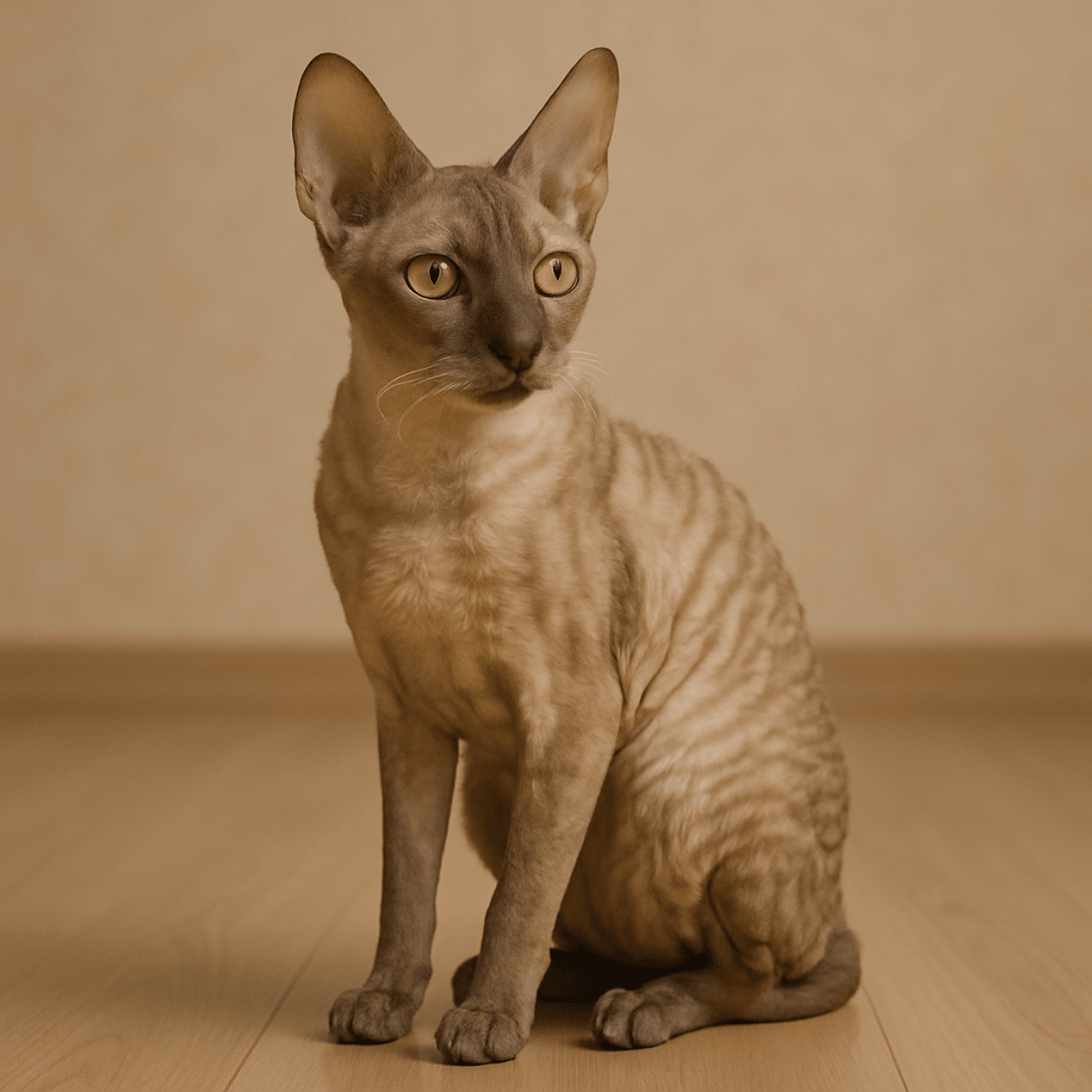
Cornish Rex – Sensual elegance in a feline version
Everything you need to know about one of the most unique cat breeds
When you first lay eyes on a Cornish Rex , you might think it's a cat from another world – its refined features, slender body, and uniquely wavy coat make it hard to look away. But it's not just its appearance that makes this breed fascinating. The Cornish Rex is a cat that captivates with its personality, intelligence, and... incredible devotion to humans. In this article, you'll learn about the history of this extraordinary breed, its character, grooming needs, and the reasons why a Cornish Rex may (or may not) be the perfect companion in your home.
Origin and history of the Cornish Rex breed
The Cornish Rex originates from Cornwall, a county on the southwest coast of England. The breed was created accidentally in 1950, when a kitten with an unusual, wavy coat was born from a litter of an ordinary female cat.
This kitten was named Kallibunker and became the ancestor of the entire breed. Breeders, captivated by its unique appearance, began carefully planned crosses to perpetuate the genetic mutation responsible for the wavy coat—the rex gene. Thus was born the Cornish Rex—a breed that would eventually gain worldwide recognition.
The Cornish Rex cat breed has one of the most unusual and romantic histories in the feline world. It all began in Cornwall , a picturesque region located on the southwest coast of Great Britain.
It was there, on July 21, 1950, that a special kitten was born to an ordinary house cat named Serena – a white male with red patches, who immediately stood out with his unusual, wavy, and silky coat . The kitten was named Kallibunker (often spelled Kallibunker or Kalli-Bunker) and was considered the first known representative of the breed, which was later named Cornish Rex – in honor of its place of origin (Cornish – from Cornwall) and its coat type (Rex – a term also used for rabbits with wavy fur).
🔬 The genetic mutation that gave rise to the Cornish Rex breed
The Kallibunker's unusual appearance was not the result of selective breeding, but of a spontaneous genetic mutation . This mutation involves the rex gene, which is responsible for the unusual structure of the coat. Instead of three layers of fur (topcoat, undercoat, and bristly hairs), the Cornish Rex has only an undercoat —fine, soft, and wavy.
This type of coat feels like velvet or suede , and its waviness is a distinctive hallmark of this breed. Interestingly, the Rex gene also appeared earlier in rabbits, hence the name, which has also been adopted by cats with similar characteristics. In the case of the Cornish Rex, this is a recessive mutation, meaning both parents must be carriers for the kittens to exhibit the breed's typical coat structure.
🧬 The beginnings of breeding and the spread of the breed
Kallibunker's owner, Nina Ennismore , decided to begin controlled breeding of wavy-coated cats . Initial trials involved crossing Kallibunker with his mother, Serena, to see if the unusual trait was hereditary. The results were positive – litters produced more kittens with wavy fur. This paved the way for the creation of a new breed.
Over the following years, Cornish Rex cats began to gain popularity, first in Great Britain and then in the United States, where breeders enthusiastically embraced this new breed. To expand the genetic pool, Cornish Rex cats were crossed with other breeds, including British Shorthairs, Siamese, and Burmese , which helped to solidify the breed and enhance its health.
Appearance and characteristics
✨ Fur
The Cornish Rex is the only cat breed whose coat consists solely of an undercoat —the finest, shortest layer of fur. The coat is velvety soft, wavy, and pleasant to the touch.
✨ Body
It is slender, with long legs, a deep chest, and slightly defined muscles. Despite its delicate build, the Cornish Rex is surprisingly strong and agile.
✨ Head and ears
It has a triangular head with large ears set high and wide, which give it a distinctive appearance reminiscent of… an elf or an alien from a sci-fi movie.
Personality and behavior
The Cornish Rex not only looks unique, but its behavior also sets it apart from other cats. It's a true companion .
- 🧠 Intelligent and Curious : Loves to explore, open cabinets, and solve puzzles (e.g., how to get to the food container).
- ❤️ Man is the center of his world : He willingly sits on people's laps, sleeps in bed, follows them like a shadow.
- 🎾 Loves to play : He loves to fetch, play with balls, tunnels and interactive toys are his element.
- 🗣️ Talkative : The Cornish Rex can have “conversations” with its owner by meowing in different tones.
This is a cat with a dog-like temperament that often responds to its name and even learns simple tricks.
Health and common diseases
While the Cornish Rex is generally a healthy breed, there are a few health conditions to watch out for:
- Skin problems – due to the lack of hair, the cat may be sensitive to temperature changes and injuries.
- Hip dysplasia – rare, but does occur.
- Hypertrophic cardiomyopathy (HCM) – a heart disease that can occur in this breed.
It is important to buy a cat from a legal, registered breeder that performs genetic testing and monitors the animals' health.
🧴 Cornish Rex Grooming – Is It Easy or Challenging? Here's the Truth
At first glance, the Cornish Rex may seem like a low-maintenance breed – lacking long fur, no undercoat, and virtually no shedding. However, appearances can be deceiving. While they don't require daily brushing like a Persian cat, caring for a Cornish Rex requires consistency, knowledge, and gentleness . Learn how to properly care for the skin, claws, teeth, and thermal comfort of this unique breed.
🛁 Baths – yes, Cornish Rex need regular washing!
Due to the lack of a protective layer in the form of a classic topcoat, the Cornish Rex cat's skin becomes oily more quickly. Under normal conditions, a cat's fur acts as a barrier and absorbs excess sebum. In the Cornish Rex, everything remains on the skin, which can lead to:
- unpleasant smell,
- attracting dust and dirt,
- clogged pores and irritations.
How often should you bathe a Cornish Rex?
Bathing is recommended every 2–4 weeks , using a gentle shampoo for cats with sensitive skin. It's worth remembering that not all cats of this breed enjoy water right from the start, so it's best to introduce bathing gradually, starting from a kitten's early years.
❄️ Sensitivity to cold – Cornish Rex needs warmth
The lack of a classic coat makes the Cornish Rex particularly vulnerable to hypothermia . Its slender build and thin undercoat do not provide sufficient thermal insulation, which is why:
- should always have access to a warm bed , e.g. with a blanket or a hot water bottle,
- in the colder months, it is worth considering a cat sweater – there are special models made for breeds without fur,
- not suitable for staying outdoors in autumn and winter.
Additionally, if your home has drafts or cold floors, make sure your cat is away from these sources of discomfort.
🦷 Oral, claw and ear hygiene – don't forget!
Despite its short coat , the Cornish Rex requires care for other parts of its body - neglecting them can lead to serious health problems.
🔍 Ears
This breed's large, wide ears are prone to earwax and dirt buildup . It is recommended to:
- ear check every week,
- gentle cleaning with a cotton pad and liquid intended for cats,
- avoiding cotton buds (they can damage the ear canal!).
✂️ Claws
The Cornish Rex is a very active cat, but if its claws aren't worn down naturally (e.g., on a scratching post), they should be trimmed regularly —ideally every 2–3 weeks. Excessively long claws can cause pain when walking and pose a risk of injury.
😺 Teeth
Periodontal disease is a common problem in domestic cats. The Cornish Rex is no exception, so it is recommended to:
- brushing teeth with special cat toothpaste (at least once a week),
- periodic dental check-ups at the vet,
- giving cleaning snacks or dental chews.
🧼 Do you need to brush your Cornish Rex cat?
The answer is: not necessarily , but...
Due to the delicate and short coat of a Cornish, traditional brushing is unnecessary. However, gentle stroking with a rubber glove or a special brush can help remove dead skin and strengthen the bond with your cat. However, it's best to avoid hard-toothed brushes – the Cornish's skin is thin and easily scratched.
📋 Cornish Rex Care – Summary of Responsibilities

| Care area | Frequency | Comments |
| Bath | every 2–4 weeks | gentle shampoo, lukewarm water, thorough drying |
| Ears | Once a week | ear cleaning fluid, without cotton buds |
| Claws | every 2–3 weeks | preferably trimmed with a special cutter |
| In order to | 1–2x a week | cat paste, do not use human paste |
| Fur (glove) | once a week | improves the condition of the skin, strengthens the relationship with the caregiver |
| Protection against cold | every day | a bed, a sweater, warm places in the house |
🏡 Cornish Rex and the family – is it a cat for every type of owner?
The Cornish Rex isn't just a beautiful cat with wavy fur—it's above all an animal with an exceptionally social and friendly disposition. Whether you're a family with small children, a senior living alone, or a dog owner, this cat can be the perfect family member . But is it always the case ? Let's take a closer look at who the Cornish Rex will suit best and who might find it challenging.
👨👩👧👦 Cornish Rex for families with children – the perfect playmate
If you are looking for a cat for children that will be patient, gentle, yet energetic and willing to play – the Cornish Rex is a bull's eye.
- 🧸 He loves being active – he plays fetch, chases feathers, and jumps on scratching posts.
- 💖 Is gentle – does not react aggressively to the child's gentle provocations, unless they are painful or persistent.
- 👶 He tolerates noise well – thanks to his openness and socialization, he is not stressed by the presence of preschool children.
- 📚 He fits in perfectly with everyday family life – he follows the household members around, participates in the rhythm of the day and appreciates routine.
👉 Tip for parents : it is worth teaching children to be gentle with the cat and respect its space – this is the basis of a harmonious relationship.
👴 Cornish Rex for seniors – empathetic and close
The Cornish Rex is also a great cat for seniors and single people . Its natural need for closeness and strong attachment to its owner make it an ideal everyday companion .
- 🧘 Gentle and sensitive - he likes to be petted, and often demands to be cuddled.
- 💤 Calmer than some other active breeds – they can nap for hours on their owner's lap.
- 🎧 He is not noisy – although he likes to “talk”, his meow is soft and discreet.
- 🚶♂️ It follows its owner – even around the house, which gives a feeling of closeness and presence.
It is also easy to maintain, which is important for people who cannot bend down often or have limited mobility.
🐕 Cornish Rex and other pets – a tolerant and sociable cat
Does the Cornish Rex get along with other animals? Absolutely, with proper socialization and gradual introductions. It's one of the few breeds that readily accepts other cats and even dogs in the home.
- 🐱 With other cats : As a very sociable breed, the Cornish Rex often needs another cat for company. They love playing, cuddling, and having their fur washed. However, in the case of dominant cats, it's important to ensure a calm, controlled introduction to the new member of the household.
- 🐶 With dogs : as long as the dog isn't aggressive or overly pushy, the Cornish Rex usually accepts the presence of a dog without any problem . They can even make friends, especially with calm, family-oriented breeds (e.g., Labradors, Cavalier King Charles Spaniels).
- 🐦 With other pets : Like most cats, Cornish Rex cats can have a hunting instinct for birds, rodents, or reptiles. In these cases, contact should always be supervised.
👉 Tip : Cornish Rex cats don't like being alone. If their owners are away from home for long periods of time, a second cat or dog can be a great companion and source of emotional support.
🚫 For whom might a Cornish Rex not be the ideal choice?
Despite its many advantages, the Cornish Rex will not be ideal for people :
- ❌ spending the whole day away from home – this cat really needs human contact and presence .
- ❌ who expect a "decorative cat" – not the type that lies on the windowsill for hours and does not interact.
- ❌ with very young children who are not yet taught gentleness – the Cornish Rex is patient but demands respect.
- ❌ who do not want to deal with daily ear and dental care and possible baths.
✅ Summary – is the Cornish Rex a family cat?
Yes – but with some reservations. The Cornish Rex is a cat with an exceptionally sociable, joyful, and energetic personality. It thrives in families with children, seniors, and even in homes with other pets. This breed is ideal for people who treat their cat as a member of the family and want to build a deep, emotional bond with it. This is not a cat for living alone on the sidelines. It needs affection, attention, and a place at the center of family life.
👉 More information about the origins, breed standards and its characteristic features can be found on the website of the Cat Fanciers' Association (CFA) - one of the most important felinological organizations in the world.
📚 Read also:
- 💞 How Dogs Show Affection: 10 Behaviors That Show Love
- 🚗 Safely transporting your dog in the car – a guide
- 🛏️ How to choose the right size dog bed? A practical guide with examples.
- 🪜 Dog stairs – comfort, safety and health of your pet
See more at: Petto.com.pl




 https://petto.com.pl/
https://petto.com.pl/